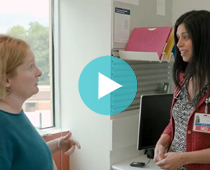Mental Health Draft
Mental health is a vital part of overall health. However, traditional mental health care services reach only a fraction of the millions who could benefit, leaving many people without support and treatment, often when they need it most.
Researchers at Kaiser Permanente Washington Health Research Institute (KPWHRI) are changing this by finding practical, patient-centered ways to reach and support people with depression, anxiety, and other mental health conditions. Over the last 10 years, several innovations in U.S. mental health care — such as adding routine screenings for depression and suicide risk into primary care — were first piloted at Kaiser Permanente Washington.
KPWHRI’s mental health researchers also collaborate with health care leaders and researchers around the country. Notably, our scientists launched and continue to lead the Mental Health Research Network (MHRN), a consortium of 14 research centers embedded in large health care systems with a shared goal of improving patient mental health through research, practice, and policy. KPWHRI is also a founding partner of the IMPACT Center, which works to improve mental health outcomes for youths through evidence-based practices.
Research highlights
 Integrating mental health into primary care
Integrating mental health into primary care
In 2015, Kaiser Permanente Washington launched a groundbreaking pilot to provide screening and support for depression and alcohol and substance use as a standard part of primary care. KPWHRI research showed this approach was successful: 89% of adults who had primary care visits were screened annually and care team members reported better patient and provider experiences and care quality. Our analysis also found that the cost per screened person was low: $5.
 Reducing suicide attempts by 25%
Reducing suicide attempts by 25%
After suicide risk screening and safety planning were integrated into routine primary care visits at Kaiser Permanente Washington clinics in 2016, KPWHRI researchers found a 25% decrease in the rate of suicide attempts in the 90 days after these visits. The study is the first to show that integrating suicide care into primary care improved suicide prevention efforts in a health care setting.
 Finding effective depression treatments, faster
Finding effective depression treatments, faster
KPWHRI researchers are using machine learning to personalize depression treatment by predicting patient responses to antidepressants. They aim to develop a model that uses electronic health records to identify the best medication for each individual. This could help clinicians and patients find a successful course of treatment more quickly.
 Engaging with teens to improve mental health
Engaging with teens to improve mental health
KPWHRI researchers are finding ways to improve teen mental health care by engaging with teens and families. In the Adolescent Integrated Mental Health Pilot, researchers are working with teens, parents, and care teams to design and pilot ways to integrate mental health screening and treatments into primary care for patients ages 13 to 17.
 Collaborating with clinicians, patients in firearm suicide prevention
Collaborating with clinicians, patients in firearm suicide prevention
KPWHRI research found that most patients are willing to answer questions about firearm access during health screenings. This provides an opportunity to engage patients at risk of suicide in safety planning. Kaiser Permanente Washington has now launched a program to provide patients with firearm-locking devices during appointments with mental health providers and pediatricians.
Researchers in Mental Health
 Gregory E. Simon, MD, MPHSenior Investigator |
 Ben Balderson, PhDSenior Collaborative Scientist |
 Katharine A. Bradley, MD, MPHSenior Investigator |
 Paula Lozano, MD, MPHSenior Investigator; Director, ACT Center |
 Robert Penfold, PhDSenior Investigator |
 Susan M. Shortreed, PhDSenior Biostatistics Investigator |
 Dori E. Rosenberg, PhD, MPHSenior Investigator |
 Gwen Lapham, PhD, MPH, MSWAssistant Investigator |
 Jennifer F. Bobb, PhDAssociate Biostatistics Investigator |
 Julie Angerhofer, PhD, MPHAssociate Investigator |
 Paige D. Wartko, PhD, MPHSenior Collaborative Scientist |
 Yates Coley, PhDAssociate Biostatistics Investigator |
 Abisola Idu, MS, MPHCollaborative Biostatistician |
 Eric Johnson, MSSenior Collaborative Biostatistician |
 Rod L. Walker, MSPrincipal Collaborative Biostatistician |
 Robert D. Wellman, MSPrincipal Collaborative Biostatistician |
 Leah K. Hamilton, PhDSenior Collaborative Scientist |
 Brian D. Williamson, PhDAssistant Biostatistics Investigator |
 Rosemary Meza, PhD, MSCollaborative Scientist |
 Morgan Justice, MACollaborative Scientist |
 Theresa E. Matson, PhD, MPHCollaborative Scientist |
 Lily N. Shapiro, PhDCollaborative Scientist |
AFFLILIATE RESEARCHERS
Paul Crane, MD, MPH
Professor, Internal Medicine
University of Washington
Patrick Heagerty, PhD
Professor and Chair, Department of Biostatistics
University of Washington
Laura P. Richardson, MD, MPH
Adolescent Medicine
Seattle Children's Hospital
Professor, Department of Pediatrics
University of Washington
Noah R. Simon, PhD
Assistant Professor, Biostatistics
University of Washington
Principal Investigator, Therapeutics Development
Seattle Children’s Research Institute
Emily Williams, PhD, MPH
Investigator
Health Services Research & Development
VA Puget Sound Health Care System



